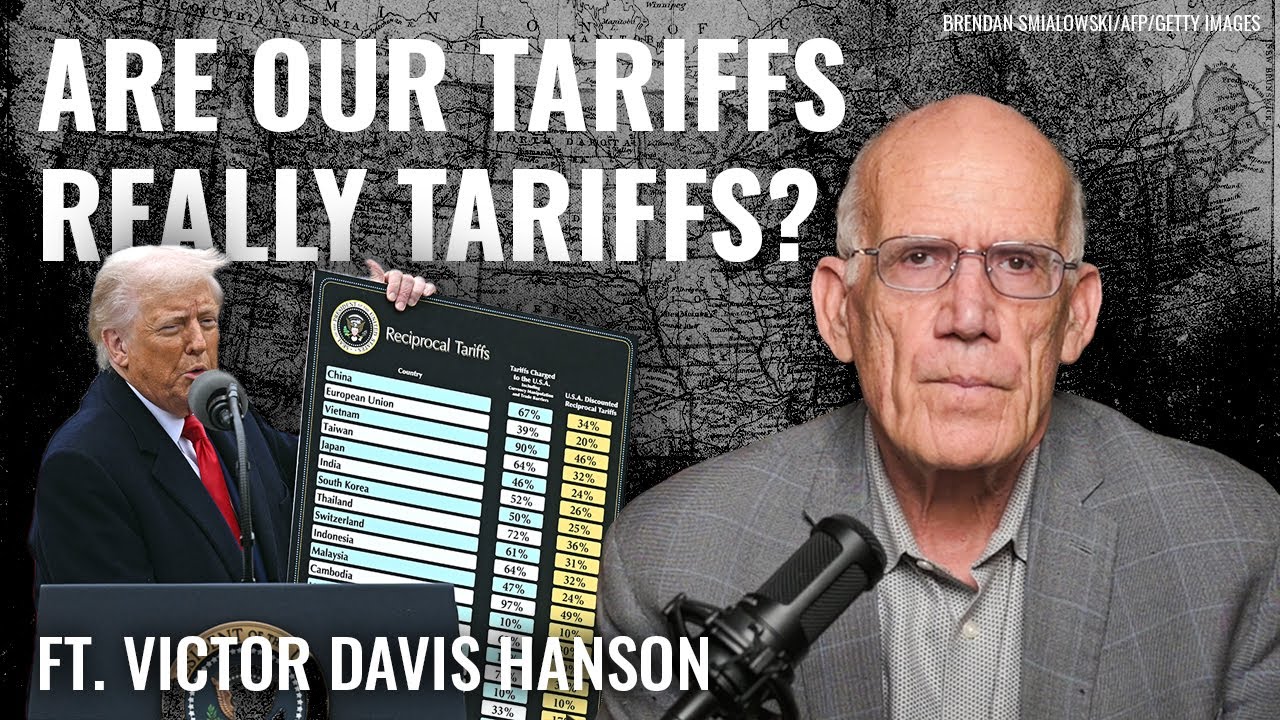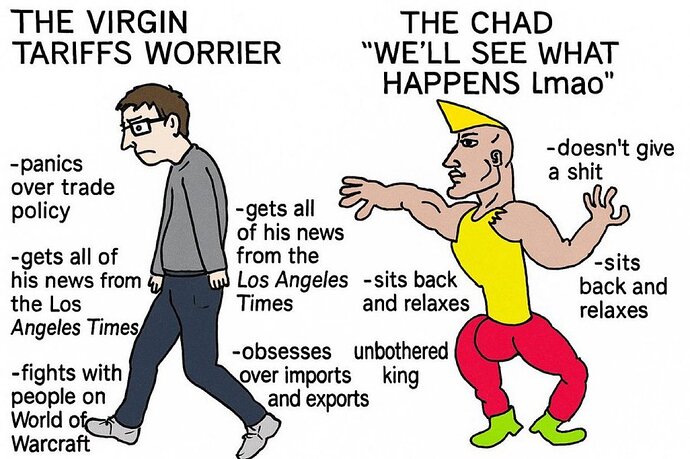A new Executive Order in response to the Tariff Tantrum:
https://x.com/patriot_savvy/status/1909696931024048386
The economic arguments in favor of free trade are elegant, but the theory hardly matches reality. I recommend Ian Fletcher’s “Why the theory of comparative advantage is wrong” as a counterpoint.
Is Ian Fletcher smarter or more realistic or pragmatic than Milton Friedman?
serious question…
edit: Adam Smith advocated for free trade in 1776, Wealth of Nations. He preceded Ricardo.
There’s plenty to learn from both Friedman and Smith, but no one is right 100% of the time. The historical results of free trade, e.g., the United States exporting its labor and capital to foreign countries, do not match the predictions of free trade economists, and have not been entirely favorable.
This.
I believe it is because labor is not easy to trade across borders, and countries that try to make it so lose their identity, or lose their economic capacity. Both of the latter have been running wild here in the U.S.
Implicit in “Free Trade” theory is that trade is always balanced. Makes sense – why would any country exchange Real Goods & Services for IOUs?
In reality, we have seen persistent unsustainable trade imbalances – US Trade Deficits, many other countries Trade Surpluses – covering periods of decades. The “Free Trade” theoretical model has failed its Real World test.
One could make a case that, over the long term, trade surpluses will be just as damaging to a country as trade deficits. We’ll see!
2 brief points:
- agriculture is a large if not the largest export industry but employs less than 1 percent of the workforce
- the best way to produce jobs is to encourage American firms to stay home and foreigners to set up shop in America (in-sourcing vs outsourcing)… what is the best way to encourage in-sourcing? reduce or eliminate corporate taxes… attract foreign and domestic investment, have capital flow into USA
add: China announces 84% retaliatory tariffs on US goods \ stacker news ~econ (this comment not entire thread)
I finally got around to watching the VDH video at the top of this thread. While Hanson makes some reasonable points, the entire discussion is framed in terms of economic statistics, specifically GDP and trade deficits. There’s more to life than per capita GDP.
As @pturmel pointed out, above, there are more important downsides to the path the US has taken for the last half-century or so than the strictly economic. As a good CivNat and believer in Magic Dirt Theory, Hanson is fine as long as the workers are within the boundaries of the US. This, in spite of the fact that he has extensively documented the effects of illegals in his own community.
There are plenty of other nits to pick, such as the misleading analogy with the war in Ukraine, but the main fault is in equating economic performance with a successful society. While the two are related, they are not identical. Not everything can be readily reduced to economic value. For instance, what is the economic cost of your small town being overrun by newcomers who don’t speak your language, don’t share your values, and maybe eat the wildlife in your public parks? What is the economic value of a high-trust society?
Another problem with the finacialization of the economy is that the profits are privatized, while the costs are socialized. Cheap imported labor makes for a nice bottom line as the social capital is destroyed. Those who can afford to flee the effects, it’s been great. However, most Americans would gladly give up some per capita GDP in exchange for safe neighborhoods and no weird foreigners with alien values lecturing them about the right way to organize their society.
What has been one of the major (if unspoken) encouragements of out-sourcing? Excessive regulation … and its partner, greedy Big Law suing everyone in sight.
If we repealed all regulations that do not meet a stringent guideline of benefits well exceeding costs, and cut the legs out from under Big Law, the US would see plentiful in-sourcing and re-shoring.
Unfortunately, only Congress could implement such a sensible pro-American scheme. And we all know that our worthless but inexplicably wealthy CongressScum care only about their own bank balances. This is what we call “democracy”.
Of course, the numbers may be correct. They may also reflect the changeover of who is doing the numbers.
The numbers may be bogus but they always have been. However, if there was a change in the methodology, CNN, MSNBC, and all the other kooks would be shouting about it from the rooftops. It’s not as if there’s any shortage of deep-state leakers at BLS.
In other news, the Ice Queen is supporting Trump on tariffs. Will wonders never cease!
Another problem with the free trade argument is the erroneous assumption that all trade is beneficial in the ex-ante sense. If two countries trade, it must have benefited both countries, otherwise they would not have agreed to trade. This is manifestly false when we consider the exchange of harmful goods. Friedman said he would rather have foreign products than idle gold, but did anyone benefit from exchanging their gold for opium under the Qing dynasty? Likewise, it’s not clear that satisfying our materialistic impulses with baubles from China has any long-term benefits for society.
In the interests of accuracy, Chinese importers of English-owned opium paid in silver, since silver was the primary currency metal in China. See Jin Xu’s surprisingly readable book “The Empire of Silver: A New Monetary History of China”.
Who benefitted? The English Upper Class, who were running out of silver to trade for Chinese goods before they hit on the idea of exporting opium. Who was harmed? The Indians who labored in miserable conditions to produce the opium and the Chinese who consumed it – People of Color, as today’s Lefties would have it.
Of course, that can hardly be characterized as “Free Trade”, since it took place under the barrel of English guns.

